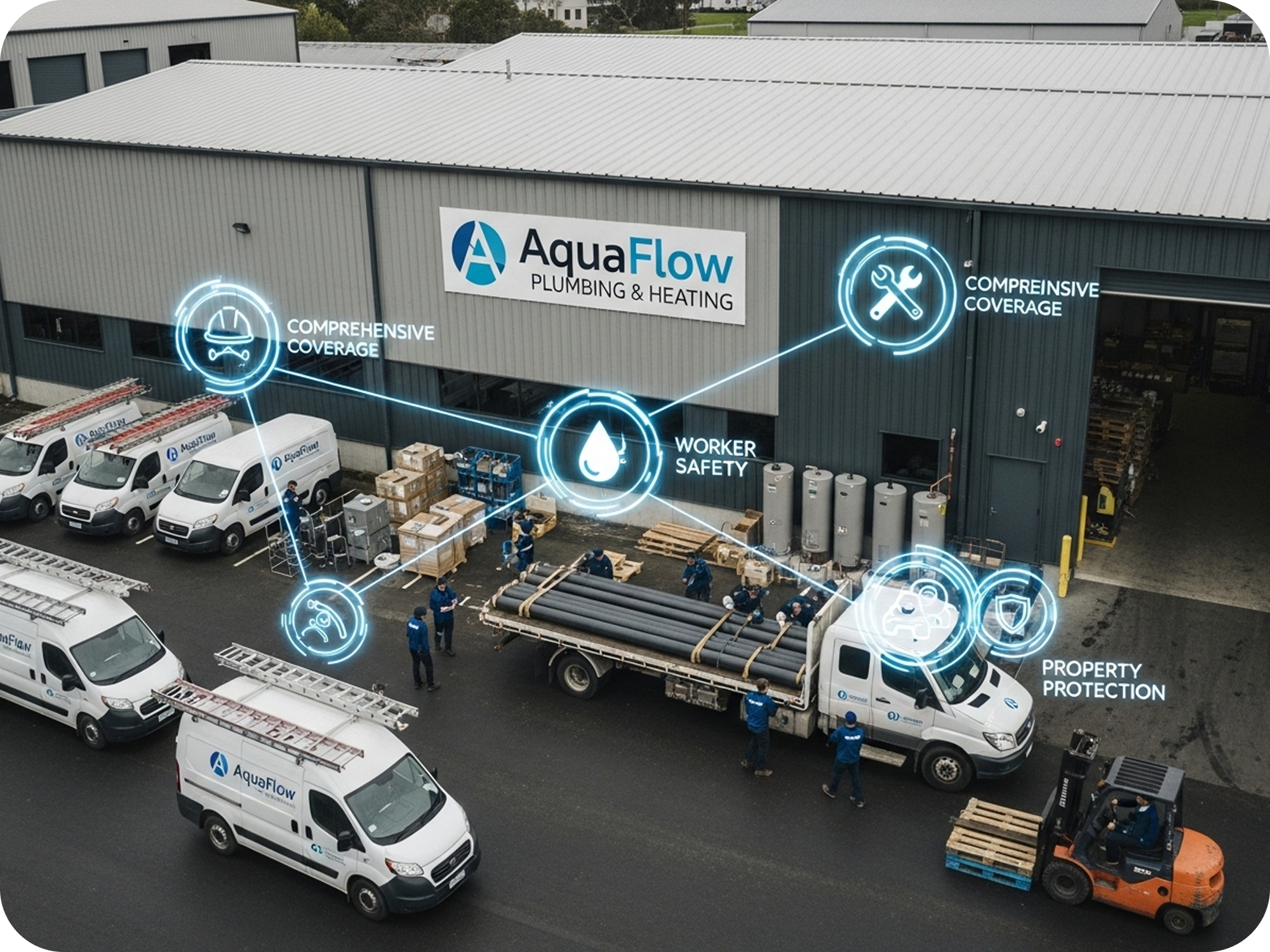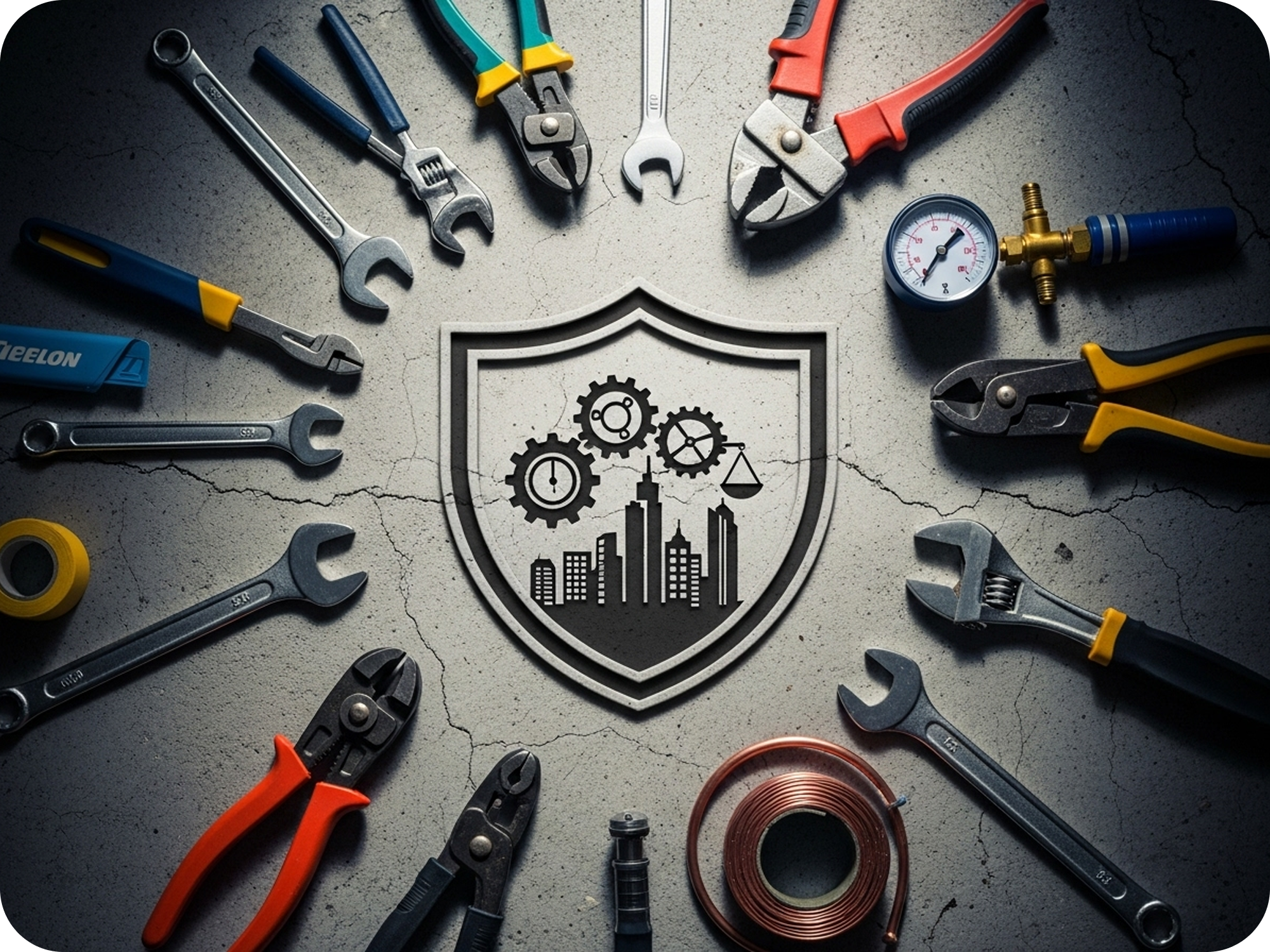How Much Does Plumbing Contractor Insurance Cost? A Plumbers Guide for Plumbing Insurance
- Plumber liability is a type of insurance policy specially designed to protect businesses from financial risks like liability, property damage, and equipment loss, all of which are prevalent in the plumbing business.
- General liability insurance is the cornerstone for plumbing companies, providing essential professional liability against third-party claims and lawsuits due to bodily injury or property damage. High limits are required to provide adequate safeguard in potential high-risk situations.
- Asset insurance, such as equipment and commercial property insurance, is essential to safeguard your tools, machinery, and business premises against theft, harm, and business interruption. Additional endorsements may add even more to address unique risks faced by plumbing operations.
- Workers compensation insurance and strong safety programs are critical for workforce protection, assisting in controlling workplace injuries, medical costs, and possible litigation. By actively managing risk and training workers to avoid incidents before they happen, we not only minimize incident rates, but liability costs.
- Depending on your business size, scope of services, insurance requirements and policy costs vary significantly. Pipefitting services should periodically review their policies, ensure they’re meeting any legal mandates and adjust coverage as operational needs evolve. Correctly describing your services and keeping meticulous records are key to best protection and premium management.
- By choosing an experienced plumbing contractor insurance provider, investigating online policy management, and employing smart premium reduction strategies like bundling policies and investing in safety, draining contractors from independent contractors to large-scale enterprises can optimize assurance while minimizing costs.
Plumbers Business Insurance and Plumbing Contractors Insurance: Coverage, Cost, and Benefits
We will provide you with insurance in the course of working risks, such as damage to property, injuries, or claims from customers.
Common protection usually includes general liability, workers’ compensation, and tools insurance. The right insurance helps a pipefitter protect their business against large expenses from accidents or lawsuits.
Most importantly, many clients will request insurance before they hire. To assist you in selecting the optimal plan, this post outlines what you need to know.
What are the types of Insurance?
Plumber’s liability insurance is a type of specialized policy designed to protect waterworks firms from both routine and unexpected risks. It encompasses various exposures, such as legal claims for accidents, damage, and injuries. It is crucial in an industry where sanitary engineers are exposed to hazards such as water damage, equipment theft, and injuries at the worksite.
The assurance is typically constructed with a combination of liability, equipment, and workforce protections and can be personalized for varying business sizes or requirements. In any country or area with a legitimate plumbing industry, this insurance is necessary as sanitary engineers are exposed to high-risk work.
1. Liability Protection
General liability insurance forms the foundation for most plumbing insurance plans. It covers third-party claims for bodily injury, property damage, or even advertising injury. If a plumber inadvertently floods a client’s house or a customer stumbles over tools, liability addresses the damage.
This is particularly important for small or emerging businesses, as legal claims can rapidly escalate into expensive lawsuits or settlements. Contractors liability insurance goes even further to cover risks that are specific to plumbing, like an installation error or repair that went wrong.
It’s not just about addressing legal requirements but making sure that the business can survive large claims. Without sufficient shielding, even one incident could jeopardize the business’s future. That’s why liability protection is still the first and most critical layer for any plumbing operation, big or small, anywhere.
2. Asset Coverage
Tools are the lifeblood of every plumbing contractor. Tools and machinery insurance means if they get stolen, damaged, or break down, the business can carry on with the least disruption possible. Commercial property insurance extends to cover the whole workshop, office, or warehouse.
It protects against losses due to fire, theft, or vandalism, which are risks regardless if you’re in the city or the wilderness. Another important add-on is equipment breakdown insurance. If a key piece of machinery breaks down, insurance can cover the cost to repair or replace it, avoiding work disruptions.
Drainage contractors frequently purchase add-on policies for special assets, such as commercial vehicles or costly diagnostic equipment. Asset shielding isn’t just about replacement; it’s about staying on schedule and leaving customers happy.
3. Workforce Security
Workforce security covers medical expenses and lost wages if an employee is injured at work and is often legally required. Plumbing is a dangerous trade and injuries can result in lawsuits if not addressed properly. This coverage protects the company and its workers by handling bills and legal claims promptly.
Medical payments coverage is a nice add-on for taking care of initial treatment. A robust workplace safety program can go a long way toward reducing both your injury rate and your insurance premium over time. Other plumbing companies utilize safety incentives and ongoing training to keep everyone alert and safe.
4. Contractual Compliance
Almost all plumbing agreements will require insurance coverage before work begins. By complying, a business can win new projects and establish trust with general contractors or clients. Grasping every insurance term in a contract is necessary because overlooking a clause could result in conflicts or loss of business.
Periodic contract reviews ensure insurance coverage stays up to date with evolving needs or emerging risks. Plumbers in certain locations require a surety bond, which is a form of guarantee the job will get done. These bonds and insurance run a range of prices, but it’s a typical part of business in the trade.
Why You Need Plumbing Insurance
Plumbing is a trade full of manual labor, always on the go and a different job site every day. It’s a risky field where plumbing professionals encounter accidents, surprise property damage, and equipment malfunctions regularly. Therefore, comprehensive plumbing insurance coverage isn’t a luxury; it’s an integral part of conducting business securely and in compliance with general liability insurance requirements.
Inherent Job Risks
- Water leaks or burst pipes causing structural damage
- Damage to third parties due to slips, falls, or exposed pipe.
- Loss or theft of specialized tools and machinery
- Equipment failure leading to incomplete jobs
- Fire or electrical hazards during installation or repairs
- Gradual pipe failures discovered weeks or months later
- Accidents involving heavy materials or working in tight spaces.
A plumber’s day often involves handling pressurized water lines, sharp tools, and heavy equipment, which can lead to significant liabilities. Accidents can occur despite rigorous safety regimens. For instance, a burst pipe can flood a home, inflicting damages that average more than $11,000 to repair. Such incidents highlight the importance of having a comprehensive plumbing contractor’s insurance coverage to protect against unexpected claims.
Slow leaks or loose joints can remain undetected for months, only to surface later and result in substantial claims against the plumber, even years after the project is complete. This underscores the necessity for plumbing professionals to have a well-structured insurance policy that addresses their specific needs.
Very costly tools are another concern. We saw tons of other freelancers with $15,000 to $40,000 worth of gear. Losing or having your tools stolen can stop work and even cause severe financial hardship if you’re not properly insured.
In colder regions, extra risks arise, like frozen pipes and ice dams that can lead to catastrophic damage. Prevention measures, such as continuous training and defined safety protocols, are beneficial, but ultimately, having the right plumbing contractor business insurance is what separates a business from catastrophe.
Client Trust
Insurance is not just a safety net. It says to clients that you’re serious about your work. By showing proof of insurance, your clients see a plumber who is a professional and one who stands behind their work and cares about protecting both parties.
That credibility is vital in a saturated space where clients crave confidence that their asset and their investment are protected. Customers want to see evidence of coverage before engaging, particularly for large assignments.
Insured plumbers can win more jobs because they offer peace of mind that unlicensed or uninsured competitors can’t provide. Transparency about your insurance coverage establishes trust. Clients know you are ready for curveballs and won’t abandon them in danger if something breaks.
Legal Mandates
Plumbers have rigorous legal obligations to meet in most areas. Most cities demand insurance to issue permits, and some even ask for performance bonds on major city jobs. Skipping this step can mean denied permits, fines, or a stop-work order, all of which can jeopardize a business.
To ignore or miss these rules can mean lawsuits or loss of licenses to do business. Laws change all the time, so plumbers have to keep up. Working with a licensed insurance agent ensures that you’re covering all the right requirements, staying up to date on paperwork, and having coverage that fits the risks you face every day.
Who Needs Coverage?
Plumbers insurance is essential for any plumbing professionals, regardless of size. Whether you’re a solo shop, a two-man operation, or a larger enterprise, general liability insurance protects you against lawsuits and damages. Many areas require that licensed plumbers carry certain types of policies. The right coverage can mean the difference between a minor inconvenience and a significant financial loss for your waterworks firms.
Solo Operators
A solo operator probably only needs some basic plumbing business insurance to protect personal assets from claims and legal expenses. Even one small goof on a job, such as water damage resulting from a botched repair, can lead to costly litigation. For many, cheap coverage is key, and there are even one-person company policies that keep the perils low but provide good coverage.
For instance, bundling your general liability insurance with commercial property insurance could save you money and reduce the paperwork, allowing the solo plumber to get back to work. It’s wise for solo operators to examine their specific needs prior to selecting a policy.
A plumber who just does minor repairs might require less coverage than one who installs new plumbing or works in a commercial environment. Licensed professionals should see if the state mandates certain insurance to function legally.
Small Businesses
For small plumbing companies, a business owners policy (BOP) is a good way to combine several important coverages in one. This could be property insurance, liability insurance, and even business interruption coverage that covers lost income if you’re forced to shut down.
New hazards come with hiring employees. Work comp is crucial to cover work-related injuries and illnesses. Even with one or two staff, a workplace injury could bite hard without coverage.
Having trucks for hauling tools and materials necessitates commercial auto insurance because personal auto policies won’t cover business use.
- A business owners policy (BOP) for small plumbing companies combines three key protections: property insurance covers damage to owned or leased spaces and equipment, general liability insurance protects against claims of bodily injury or property damage from clients or third parties, and business interruption insurance will cover lost income if the business has to shut down temporarily. This bundled strategy maintains coverage broad and affordable.
Large Enterprises
Big plumbing companies are more at risk. With more employees and bigger projects, they have more liability exposure and stronger insurance needs. Custom packages are usually required to align with the unique business models, project types, and equipment.
Risk management is necessary at this point. By catching hazards early, like employee training and equipment maintenance, insurers can reduce rates and prevent claims.
By working with specialty insurance agents, big firms can design customized solutions that match shifting risks and compliance demands and provide continued coverage.
Understanding Your Policy Cost
Plumbers insurance premium are influenced by fundamental factors such as the size of your plumbing business, the specific services you provide, and your claims history. Understanding how these factors interplay is crucial for making informed decisions about general liability insurance and coverage needs.
Business Size
Large plumbing companies tend to pay more. More workers, more tools, and several different work locations lead to more exposure. For instance, a business with more than 10 employees will experience an increase in premium rates, mirroring the increased risk and liability.
Smaller companies can get better prices, but still have to pay for their own perils. A single plumber or a duo could pay less, but need to prioritize cost and adequate coverage. For any business, it’s key to look at growth estimates and whether your size is likely to vary.
Periodic policy checkups keep coverage in line with changing requirements. As your business grows, revenue and scale change, which can mean your insurance needs to change as well.
Service Scope
The more services it covers, the higher the insurance price. A plumber providing simple residential fixes will pay less than a contractor performing commercial plumbing, gas fitting, or other specialized installations.
If you provide drain cleaning, water heater installation, or emergency repairs, these are additional risks the insurer has to price into the policy. It’s crucial to provide your insurer with an accurate representation of your real work.
If you accept new kinds of work, check your policy and inform your provider. Gaps between what you do and what’s covered can cause expensive claim denials. Review your policies at least once a year to ensure that your coverage aligns with your business.
Claims History
A clean claims run implies lower expenses and improved coverage possibilities. We reward low-risk businesses with low premiums. If your business has a claims history, particularly if you’re in an industry where claims are frequent or high value, anticipate higher rates.
Each claim notifies risk to the insurer and limits your ability to obtain preferred policies. Record-keeping of incidents and claims is essential. This record-keeping not only assists with renewals, it backs you up if conflicts occur.
Smart investments like employee training and safety checks can reduce claims. Good risk management cuts costs in the long run.
Coverage Limits
Coverage limits determine the most a claim will payout. Choosing limits that are too low can leave you vulnerable. For example, a catastrophic property damage or liability suit can exceed a basic policy’s maximum, meaning you would have to cover the difference personally.
Higher deductibles can reduce your monthly premium, but they raise your immediate expenditures if you submit a claim.
|
Risk Scenario |
Insufficient Limit Consequence |
|---|---|
|
Major property damage |
Out-of-pocket repair costs |
|
Large liability claim |
Personal assets at risk |
|
Equipment loss/theft |
Incomplete replacement, work delays |
Select limits wisely and discuss your business hazards with an agent. The typical global plumbers general liability policy runs at approximately $115 per month, although this depends on your limits and risk profile.
See what multiple quotes provide to get the most value for your money.
Beyond the Basics
Plumbers insurance is beyond the basics, as plumbing liability insurance must address different risk profiles. By leveraging technology and implementing risk control measures, plumbing professionals can safeguard resources, facilitate an efficient process, and sustain growth in the competitive construction industry.
Policy Endorsements
Endorsements can fill important holes left by ordinary policies. For instance, inland marine endorsements cover tools and equipment in transit, which is typically absent from fundamental shielding. Occupational accident is another add-on, providing personal peace of mind, principally for independent plumbers who don’t have employee benefits.
EPLI endorsements cover claims such as discrimination or wrongful termination, which can be expensive and are not covered in general liability policies. Reviewing your available endorsements each year ensures insurance grows with business needs and meets changing risks. More often than not, including these specific protections is less expensive than buying completely separate policies, which saves you time and money.
Working with an insurance agent familiar with the plumbing business will assist in determining which endorsements will align best with your operations and local requirements.
Digital Management
Having insurance handled digitally makes work flawlessly. Digital tools make it easy to keep track of policy renewals, claims status, and premium payments. Maintaining electronic documentation results in papers being filed and available anywhere, a must when addressing emergency claims or audits.
Companies can leverage easy dashboards or mobile apps to receive policy update reminders, access documents, and communicate with suppliers. This tech increases efficiency, decreases lost paperwork, and makes it simple to compare quotes from other insurers. It enhances communication with brokers and underwriters for quicker, easier claim resolution and policy changes.
Premium Reduction
Planning and discipline is what it takes to diminish insurance premiums. Increasing deductibles can make your annual rates more reasonable, but it introduces some additional cash flow considerations. Clean claims records tend to generate lower premiums, so keeping tabs on incidents is crucial.
Shopping around and comparing offers from multiple insurers helps find the best rates. Safety programs and employee training demonstrate to insurers that you’re mitigating risk, which drives down costs.
Location matters: urban businesses may pay more due to higher crime or stricter rules. To give perspective, surety bond premiums are $250 to $1,250 per year, while worker’s comp for small teams is $2,000 to $4,000. Big operations sometimes pay $41,600 to $60,700 for general liability.
Premium Reduction Checklist
- Raise deductibles (if cash flow allows)
- Maintain a clean claims ledger
- Bundle for discounts (e.g., auto with liability)
- Invest in safety and training programs
- Compare quotes from multiple providers
- Review annually for new savings
Choosing Your Provider
Selecting your insurance provider is crucial for any plumbing business. A good provider with genuine plumbing experience will identify hazards that others may overlook. They understand the claims that arise in this industry, such as water damage, tool theft, or even injury, and can guide you through the nitty gritty of your plumbing insurance needs.
A reputable provider experienced with plumbing businesses will help you select the right combination of protections and steer clear of potentially costly holes. Local agents add another layer of know-how, understanding the rules, codes, and risks that vary from city to country. Flood zones, ancient water systems, or restrictive building codes can significantly influence the insurance costs you face.
Local agents can identify specific risks, assist you in selecting types of insurance for business property, tools, and trucks, and ensure you comply with all local regulations. This keeps your business safe and legal, reducing your overall liabilities. It’s not all about price when comparing quotes; insurance rates vary widely based on your business size, the work you accept, and your exposure to risk.
Don’t settle for your first provider ask for quotes from more than one and pay attention to details like limits, what is and isn’t covered, and the cost of each policy. For most small to mid-size companies, a business owner’s policy (BOP) can package property, liability, and other types of policy. Bundling generally saves money and simplifies policy management.
Check if the provider sells business gear, equipment or vehicle add-ons. This is critical for plumbing contractors whose livelihood relies on these assets. Support is just as important as price and cover. You want a provider that responds quickly, clarifies, and assists when filing a claim.
A company with great service will walk you through paperwork and claims, so you don’t lose time or money. Look at reviews, solicit peer feedback, and investigate the provider’s reputation and financial strength. Claims handling is the real test. If they pay out claims fairly and on time, that’s a great indicator.
Your best providers have flexible policies that change with your business. As you mature or move on to new work, ensure your cover can evolve as well.
Conclusion
Plumbing is dangerous work every day. Leaks, tool loss, or hurt workers can punch you in the gut. A good plumbers insurance keeps plumbers on track and jobs secure. Choosing a plan should be done with caution. Consider your occupation, the project scale, and the group. Inquire with them on what the plan leaves out. Prices can vary quickly, so check regularly and ask a lot. Every job and every shop is different. Let your own needs guide your decision, not just price. The appropriate cover can protect your business from massive anxiety and financial damage. Be smart, be informed, and contact a trusted agent when questions arise. Post your own tips or stories below. Let’s get big together.
Frequently Asked Questions
What does plumbing insurance cover?
Plumbers insurance, also known as plumbing business insurance, can protect you from liabilities like property damage, injuries, and legal expenses resulting from accidents or errors during your work.
Is plumbing insurance required by law?
In some states, plumbing professionals must have plumbing business insurance as a legal requirement to license or work.
How much does plumbing insurance cost?
Insurance costs vary based on your plumbing business size, location, and specific needs, with small businesses potentially paying a couple hundred to several thousand US dollars annually.
Who should get plumbing liability insurance?
If you are a plumber, from plumbing contractors to independent plumbers, then obtaining comprehensive plumbing insurance is essential. It shields the business and clients from surprise expenses.
What is not covered by plumbing service insurance?
Plumbers liability insurance typically excludes intentional harm, standard wear and tear, or projects outside the assurance needs specified in the insurance policy.
Can plumbing insurance help with client disputes?
Yes, it does! General liability insurance will pay for legal fees if a client sues you because your plumbing business caused damage or a loss.
How do I choose a plumbing insurance provider?
Shop around for the best plumbing business insurance. Compare providers on reputation, specific needs, and price, focusing on those that offer comprehensive certificate of insurance.








